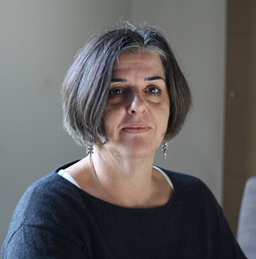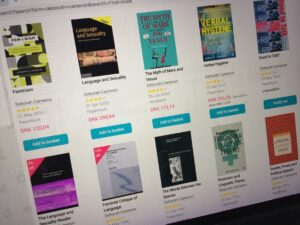Deborah Cameron has studied language and gender for around 40 years. She has written numerous books on this topic, including The Myth of Mars and Venus (2007) and Language and Sexuality (2003). She is currently a Rupert Murdoch professor of Language and Communication at Worchester College, Oxford University. Apart from her academic work, she also engages in public communication about linguistic research and feminism.
Lingoblog.dk sent me out as their reporter to ask Deborah about her work, her thoughts about political science, and the impact of linguistic, feminist research. Hopefully her reflections can inspire our readers and provide new perspectives on how and why we do research.
Can you tell me something about how and why you engage in popularised communication?

I’ve always done what’s now rather grandly called ‘public engagement’ because a lot of my work is feminist and I wanted it to be available and useful to feminists who weren’t academics or experts on linguistics. There are many things academics study which other people don’t find interesting, and where that’s the case I think it’s fine for the academics to just talk to each other. But if you work on something that’s interesting to a wider audience then why wouldn’t you address that audience as well? Of course, you do have to take a slightly different approach: when I’m teaching a course or writing an academic article I can expect my students or my colleagues to make an effort even if they don’t find the material fascinating, but when I’m giving a public talk or writing a blog post I can’t expect that. If it’s not clear or it’s not interesting people outside academia won’t go on reading. So if you want to write for a general audience you need different communication skills. But the trick, at least in my opinion, is to be clear without making it so simplistic it becomes patronising or obvious. A lot of popular writing on language is very dumbed-down, and one thing I think people like me can do is give non-experts something that’s still accessible but a bit more complicated.
By studying both gender and language, Deborah’s work is more than just purely linguistic. I asked her about that.
I do pay attention [to changing theories in gender studies], in the sense that I keep up with what’s going on, but that doesn’t mean I’m necessarily going to adopt every new theoretical tendency that comes along and use it in my own work. I’m not interested in theory for its own sake. To me it’s really a tool for thinking more systematically and more productively about the social world, so if I don’t think something is helpful for that purpose I’ll pass. There are exceptions, but in recent years I think many theoretical debates in gender studies have become very self-referential, very ‘meta’, and that doesn’t excite me.
We talk more about gender and feminism in the public than we did thirty years ago or even just ten years ago. Is this affecting the way your work is received?

I don’t think it’s entirely true that there’s more public discussion of feminism now than in the past. I came of age in the 1970s, when feminism—second wave feminism—was a militant social movement in Europe and North America, and it was very much a topic of public discussion. That continued in the 1980s, when I began my academic career. My first book, which came out in 1985, was published because the publisher thought feminism was a hot topic and would sell. The situation at that time was not that different from the way things are today. Some people thought feminist research was cool and others thought it was a load of nonsense.
One thing that has changed is that today the study of language and gender (and sexuality) is an established subfield within the discipline of linguistics: it’s become something you can take courses in, go to conferences on, do a Ph.D on. There are textbooks, there’s a journal. None of those things existed when I started out. So I guess it would be true to say that feminist work (in general, not just mine) gets a different reception among linguists now. There are still people who don’t think much of it, but there are far fewer people who think it’s incomprehensibly weird or just a passing fad.
Have your views on gender and language changed since you first started studying it?
Yes and no. As I’ve just mentioned, I’ve been studying the subject for a long time, nearly 40 years, so it would be surprising if my views hadn’t changed at all. The world isn’t the same now as it was when I started out: today there are all kinds of questions, or problems, that didn’t exist in the early 1980s (for instance, anything to do with the internet and digital media). However, there are also questions and problems—far too many of them, actually—which did exist 40 years ago and have not disappeared: in some cases they’ve arguably become more serious and more entrenched. Or else they got better for a while and now they’ve returned with a vengeance. The story of feminism is not a narrative of linear progress. It’s more cyclical, we move forward for a while and then we’re forced back onto the defensive (as we are being at the moment with the rise of nationalism, populism and an organised online movement of anti-feminist men).
My thinking about language and gender is certainly influenced by what’s happening in the world and what’s important to feminists now, but I haven’t seen much reason to abandon my basic understanding of how patriarchal societies work and what part language plays in that. That doesn’t make me happy, by the way: when I was in my 20s I thought things would have changed far more by the time I hit my 60s, and it’s depressing that so many things are still the same.
Deborah’s research topics are often very political. I asked her how this affects her perception of herself as a scientist.
That’s a difficult question for me to answer. It reminds me of something Zaha Hadid said when she was asked what it was like to be a woman architect. She said, ‘I don’t know, I’ve never been a man’. Similarly, I have never been a non-political researcher. It’s not just the gender stuff: my work on research methods was political, so was my work on verbal hygiene, and the book I wrote about communication training… Relating linguistic practices to social structures and the workings of power is basically what I do, so I don’t really have any other way of working or of perceiving myself.
How much do you consider the possible political applications when you conduct research?
I don’t think about how my research might change policy, or the law, because it isn’t that kind of research. What I do consider is how my writing, based on both my own research and other people’s, might help to change readers’ minds, or provide them with ammunition in arguments with other people. Most often my aim has been to challenge folk-myths about language, and sometimes theories that are influential among academics, which I think are misguided and damaging. And that is a political aim: changes in the way people think about the world are part of the process of changing the world itself.
I asked Deborah about how her research can make a change in the world:

If it does make a difference, the difference it makes will be the kind I’ve just mentioned: changing people’s minds or ways of thinking. But even that kind of change very rarely happens because of a single individual’s work. I have sometimes had messages from people saying ‘that book you wrote/that class you taught changed my life’, and that’s very gratifying, but ultimately I think it exaggerates my (or any other single person’s) influence. Feminist research is part of a larger movement, which also includes many other enterprises from political activism to poetry and art, and it’s really the whole movement that creates change.
Last question: If you had unlimited funding and resources, what research project would you do?
The projects I fantasise about doing wouldn’t need unlimited funding, the problem is more that they would never get approved by the ethics committee! But to be more serious about it, I think that most people (though of course there are exceptions) have their most original or imaginative ideas for research projects when they’re at an earlier stage of their careers. I’m near the end of mine now, and I’d rather see the resources given to the rising generation of researchers. So — over to you!
Liv Moeslund Ahlgren is an MA student of linguistics at Aarhus University. She has worked with gender studies and postcolonialism as a part of her linguistics minor






Wow! Fantastic. Deborah Cameron is an influential researcher, and it is very good to hear her thoughts on the science/politics interface. A good idea to interview her and the result is very informative. Thank you!